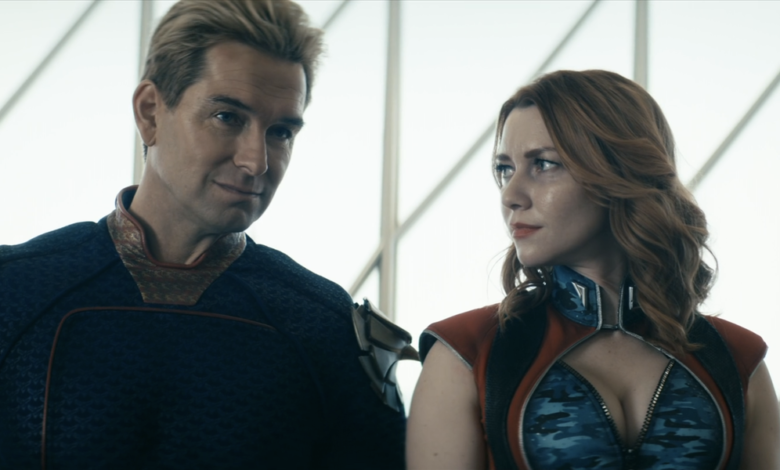The Boys Season 4 Finale Has an Ending Filled With Shifting Power Dynamics

The following story contains spoilers for The Boys season 4 finale, “Season Four Finale,” originally titled “Assassination Run.”
FLIGHT, SUPER-SPEED and strength, X-ray vision, heat vision, and laser eye beam vision; what other tool does a sadistic, fragile narcissist need in their kit to overthrow the U.S. government and bend its institutions to suit their whims? A brain, in fact, one thing Homelander (Antony Starr), the lead supervillain in hero’s clothing on Prime Video’s The Boys, partially lacks.
Homelander isn’t a dummy. That designation goes to The Deep (Chace Crawford), his dimwitted maritime subordinate on The Seven—a cruel parody of the Justice League, DC Comics’s iconic superteam. But he isn’t smart, either, and above all else, he isn’t discrete. Throughout The Boys’s run, Homelander’s designs on attaining power—power beyond the varied special abilities he already possesses, the kind of power that can bring to heel corporations and capitalist nations alike—have been thwarted in part by Billy Butcher (Karl Urban), the crusty leader of the clandestine vigilante group the show is named for, and also in part by his own lack of circumspection.
Homelander can’t bite his tongue or choke down his roiling frustrations when his plans fall apart, which they inevitably do, because again: he isn’t the smartest person in the room, but he fancies that he is, because anything less than peerlessness in any and every possible field would pierce his ego. So when he commissions an auxiliary “Supe,” Sage (Susan Hayward), the smartest person on the planet, for her help in architecting designs for a coup d’état, he’s doing the unthinkable—he’s admitting that some things he can do, others can do better. Like treat American presidential politics like a game of chess where victory is secured through chicanery, bullshit, and, yes, bloodshed. At least Homelander excels at that over literally everybody else.
But his propensity for violence isn’t, in the end, what puts him in the Oval Office. It’s Sage’s propensity for thinking a hundred steps ahead in the game, like The Queens Gambit main character Beth Harmon, but with a far wider competitive streak.
What Happens At The End Of “Season Four Finale”

For the briefest of moments, the season finale tricks us into thinking that Sage lost. Homelander does, after all, boot her from The Seven in a fit of pique one episode prior in “The Insider,” when she admits to knowing A-Train was “the leak,” responsible for giving The Boys proof that the Starlighters—supporters of Annie “Starlight” January (Erin Moriarty)—are innocent of killing three of Homelander’s supporters, whom he has beaten to death in the season premiere by Deep and Black Noir II (Nathan Mitchell) (for the sole purpose of framing the Starlighters). What a tangled web Sage weaves. On the upside, Homelander doesn’t, in his own words, “send her home in a bucket” after her confession, in one of the show’s more creative and nauseating descriptions of what happens to schmucks who incur his wrath.
Without Sage in his corner for the finale, the plan is preordained to fail. But Sage keeps her cards close to the vest and bakes contingency after contingency into her plan to ensure that however her opponents’s cards fall, she’ll maintain the upper hand. (Whether it’s chess or poker, Sage is quite the gamesman.) So as Homelander sits in his apartment, left in shambles by one of his trademark temper tantrums, convinced that he lost, Sage sneaks in and pulls back the curtain: she got the would-be President of these United States, Robert Singer (Jim Beaver), on camera acknowledging his attempted hit on his running mate, Victoria Neuman (Claudia Doumit). This is a party foul. Singer is arrested. Neuman is already dead at Butcher’s anime tentacles hands; and the bootlicking Senator Calhoun (David Andrews) is next in line for the presidency.
Calhoun is a sworn loyalist to Homelander. He’s the President, but for all intents and purposes, Homelander’s really in charge; you don’t kiss an amoral supe’s ass without sacrificing most, if not all, of your power.
The Homelander-In-Chief

The Boys jams rich subtext into the fallout of Sage’s successful palace revolution. Her parting exchange with Homelander in particular is layered by, among other things, her awestruck sensation of winning, of setting out to topple the government and steal the presidency and finding out that yes, she could. Despite it all, there also seems to be a sense of gratitude for the chance Homelander gave her by investing his trust in her in the first place. Homelander, on the other hand, is likewise struck by disbelief that Sage, who could have just walked away and stayed away after his harsh dismissal, pulled through for him. Imagine what kind of man he’d have become if he’d grown up surrounded by people who actually gave a shit about him. (Admittedly, Sage cares about her plan far more than she does about Homelander, but still.)
But “Season Four Finale” (previously called “Assassination Run” and changed after last week’s presidential assassination attempt) highlights the limits of Homelander’s power to a degree that the series simply couldn’t have done until now. The Boys has always fixated on levers of institutional power, whether the institution is Vought International—the insidious mega conglomerate responsible for making, marketing, and monetizing Supes—or the United States government. Concurrently, it’s always been about Homelander trying to grab hold of those levers for himself, too, whether ousting Vought CEO Stan Edgar (Giancarlo Esposito) by effectively blackmailing Neuman into exposing his corporate corruption (see: season 3’s “Glorious Five-Year Plan”), or by letting a commercial airplane crash into the ocean, killing all of its passengers, and lying about why it crashed in order to leverage militarization of Supes. Cast in that light, season 4’s outcome is nothing new.
The difference in “Season Four Finale” compared to “Glorious Five-Year Plan” is scope, and how that scope reveals Homelander’s weakness. It’s understood that his greatest weakness is his own stew of neuroses, which also happens to be the audience’s “in” for empathizing with him. Homelander is stymied by abject insecurity, which Sage alludes to in her venomous rebuke to being unceremoniously fired from The Seven; he is “the one person” he’ll “never, ever defeat.” But his other weakness, previously only dimly recognized in the series, is that for all his raw power, he’s actually helpless against the system. Yes, he can credibly threaten, say, Neuman, to get his way, and he can change Vought from within; no, he can’t take his power grab further than that by strong-arming people, and for as much influence as Vought wields, domestically and globally, it can’t provoke the seismic shift he craves. He wants more. All he has are his piddly laser eyes.
Sage completes Homelander. In a way, she’s the worse of the two; Homelander may be a self-obsessed and thin-skinned megalomaniac, but Sage is just bored. Like Homelander, it’s entirely possible that if life had given her the respect and opportunities she deserved, Sage wouldn’t feel a compulsion to engineer Homelander’s coup d’état just for shits and giggles. There’s nothing amoral about Sage’s plan, though—it’s just an itch she scratches because she can, not because she believes in Homelander and his cause.
Sage is a terrific foil for him, vastly underpowered by comparison but superior where it counts. Without her contributions, there wouldn’t be a coup d’état. There wouldn’t even be an outline for executing a coup d’état. Homelander would twiddle his thumbs with Vought in his palm, clueless about what to do with its resources; Starlighters and Homelanders would stand on opposite sides of the aisle barking harmlessly at each other; The Boys would figure out that Butcher is host to a parasite plaguing him with hallucinations of his dead wife Becca (Shantel VanSanten) and equally dead comrade Kessler (Jeffrey Dean Morgan).
Super Isn’t Super Enough

The Boys has a hoot and holler staging the sort of super-mayhem that’s fundamental to any superhero production, whether in film or television. Few of these sequences involve Homelander, naturally, but one brawl in the season’s penultimate episode pitting Annie, Butcher, and M.M. (Laz Alonso) against The Deep and Black Noir II is liable to give viewers goose pimples. It’s hilarious in The Boys’s tongue-in-cheek way, not the least because no one expects Black Noir II to talk (his predecessor was the strong but silent type), and it’s demonstrative of what good superhero storytelling should look like; timely intervention by A-Train (Jessie T. Usher), Deep and Noir’s fellow member in The Seven, saves the day and caps off the character’s season-long redemption arc with a blitz of right hooks.
But satisfaction through spectacle, slathered with copious gore, is window dressing for this show. Its primary interest is in those levers of power: Who controls them, what they did to get their hands on them, and what it takes to wrest them away. Central to that motif is Homelander himself, the most powerful man on Earth, who despite all of his power is powerless to do what he wants: Anything. He’s thought that he can do anything he wants since the first season, and learned along the way that, in fact, he can’t. Here, he finally gets free rein to do as he pleases, because he placed faith in another person, Sage, to pull off with her brains what he can’t with his brawn. As dangerous as Homelander is, season 4 underscores that he’s not as dangerous as he could be. It takes intellect to make him the monster we’ve all feared.



